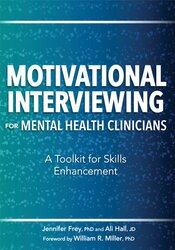Turning “What’s Wrong” into “What’s Strong”
Shifting to a Strengths-Based Perspective with Motivational Interviewing

Motivational interviewing (MI) spirit is a heart-set and mind-set we bring to the helping relationship, a way of being with people as we serve them. We think of MI spirit as a dynamic intersection of partnership, acceptance, compassion, and evocation. We work together in a shared way and we convey acceptance of the other in their absolute worth, from an affirming stance, with accurate empathy, to support their autonomy. We prioritize their needs and wants, and we bring forward their hopes, dreams, motivations, expertise, and ideas for change.
Our ability to convey MI spirit derives at least in part from cultivating and holding the belief that people already have inside them the capacity and potential for change. One way that this belief manifests is through an ongoing “treasure hunt” for a person’s skills, strengths, capacities, and efforts. We can run aground when we search for “what’s wrong” in a situation or see the person as “ineffective.” With a shift in perspective, we can instead discover “what’s strong.” Consider this case example:
A group of detention officers in a juvenile justice center were perplexed about a 17-year-old young woman, Tanya, held there. They talked together in a team meeting with some outside practitioners about how she had, on three occasions, nearly completed her mandated month’s stay, only to engage in some small infraction that extended her time. “She’s going to be 18 on the day now set for her release. Can you believe it?” one said to another. “She seems smart, but how dumb can you be? She’s so impulsive and doesn’t understand the rules here; just no insight at all. One month is now going to be 10 months by the time she gets out of here. What a waste!”
A consulting mental health practitioner looked at this situation differently. From her perspective, working with exploited youth, Tanya’s actions made perfect sense. At the time of her arrest, Tanya had been in a department store with the man who was exploiting her. She took a big step away from him, grabbed a package of socks, waved it in front of the security camera, and then concealed the package in her coat. Being taken into custody and charged with shoplifting separated her from this man, and rather than be released to him, she extended her stay at the detention center so that she could be released as an adult on her 18th birthday. “In my opinion, she is clever, insightful, knowledgeable, and resourceful,” said the practitioner. “Adding time to her stay was the best way for her to maintain her current, relative safety until her release as an adult.”
If you have trouble seeing Tanya’s shoplifting from a strengths-based perspective, as the detention officers did, you are not alone. This deficit perspective is typical of how some of us were raised. Often, we begin to embrace and develop a strengths-based perspective for the first time when we start practicing MI. Try this exercise to see if you can get into the practice of turning “what’s wrong” into “what’s strong.”
Click here to download the Turning "What's Wrong" into "What's Strong" exercise from Motivational Interviewing for Mental Health Clinicians: A Toolkit for Skills Enhancement.
*This is an adapted excerpt from Motivational Interviewing for Mental Health Clinicians: A Toolkit for Skills Enhancement by Jennifer Frey, PhD, and Ali Hall, JD. Copyright © 2021, Jennifer Frey and Ali Hall. PESI Publishing.
Our ability to convey MI spirit derives at least in part from cultivating and holding the belief that people already have inside them the capacity and potential for change. One way that this belief manifests is through an ongoing “treasure hunt” for a person’s skills, strengths, capacities, and efforts. We can run aground when we search for “what’s wrong” in a situation or see the person as “ineffective.” With a shift in perspective, we can instead discover “what’s strong.” Consider this case example:
A group of detention officers in a juvenile justice center were perplexed about a 17-year-old young woman, Tanya, held there. They talked together in a team meeting with some outside practitioners about how she had, on three occasions, nearly completed her mandated month’s stay, only to engage in some small infraction that extended her time. “She’s going to be 18 on the day now set for her release. Can you believe it?” one said to another. “She seems smart, but how dumb can you be? She’s so impulsive and doesn’t understand the rules here; just no insight at all. One month is now going to be 10 months by the time she gets out of here. What a waste!”
A consulting mental health practitioner looked at this situation differently. From her perspective, working with exploited youth, Tanya’s actions made perfect sense. At the time of her arrest, Tanya had been in a department store with the man who was exploiting her. She took a big step away from him, grabbed a package of socks, waved it in front of the security camera, and then concealed the package in her coat. Being taken into custody and charged with shoplifting separated her from this man, and rather than be released to him, she extended her stay at the detention center so that she could be released as an adult on her 18th birthday. “In my opinion, she is clever, insightful, knowledgeable, and resourceful,” said the practitioner. “Adding time to her stay was the best way for her to maintain her current, relative safety until her release as an adult.”
If you have trouble seeing Tanya’s shoplifting from a strengths-based perspective, as the detention officers did, you are not alone. This deficit perspective is typical of how some of us were raised. Often, we begin to embrace and develop a strengths-based perspective for the first time when we start practicing MI. Try this exercise to see if you can get into the practice of turning “what’s wrong” into “what’s strong.”
Click here to download the Turning "What's Wrong" into "What's Strong" exercise from Motivational Interviewing for Mental Health Clinicians: A Toolkit for Skills Enhancement.
*This is an adapted excerpt from Motivational Interviewing for Mental Health Clinicians: A Toolkit for Skills Enhancement by Jennifer Frey, PhD, and Ali Hall, JD. Copyright © 2021, Jennifer Frey and Ali Hall. PESI Publishing.
Learn to Incorporate Motivational Interviewing Into Your Practice

Conversations about change can be challenging. In this motivational interviewing (MI) toolkit, you will find a variety of tools and strategies designed to help you apply the spirit of MI so you can more effectively evoke people’s own interests, experiences, and good ideas for change. Designed for mental health clinicians who want to deepen their learning and proficiency, this toolkit provides:
Most importantly, this toolkit offers a variety of flexible opportunities for you to actively practice the core skills of MI: Use them on your own, with a partner, with a team of colleagues, or within an MI learning community.
- Examples of how to use MI to support people experiencing a variety of mental health issues
- Activities to help you more deeply explore the fundamental concepts, spirit, and tools of MI
- Sample conversation scripts that demonstrate the MI skills in practice
- Exercises to assess your progress and gain confidence in your skills
Most importantly, this toolkit offers a variety of flexible opportunities for you to actively practice the core skills of MI: Use them on your own, with a partner, with a team of colleagues, or within an MI learning community.
Meet the Experts:
Jennifer Frey, PhD, is a licensed psychologist, clinician, member of the Motivational Interviewing Network of Trainers (MINT), MI skills coach and organizational consultant. She is passionate about working with mental health clinicians to even more effectively support people in making meaningful changes.
Learn more about their educational products, including upcoming live seminars, by clicking here.
Ali Hall, JD, is a member of MINT and is an independent consultant and trainer. She designs and facilitates MI workshops in a wide variety of contexts, including training for trainers in a number of evidence-based practices, and provides consultation for organizational implementation. She is a co-developer of the Motivational Interviewing Competency Assessment (MICA), a coding and coaching tool for MI skill development.
Learn more about their educational products, including upcoming live seminars, by clicking here.
Learn more about their educational products, including upcoming live seminars, by clicking here.
Ali Hall, JD, is a member of MINT and is an independent consultant and trainer. She designs and facilitates MI workshops in a wide variety of contexts, including training for trainers in a number of evidence-based practices, and provides consultation for organizational implementation. She is a co-developer of the Motivational Interviewing Competency Assessment (MICA), a coding and coaching tool for MI skill development.
Learn more about their educational products, including upcoming live seminars, by clicking here.



